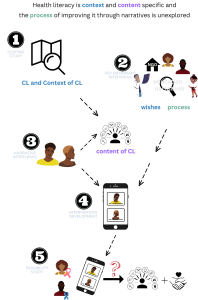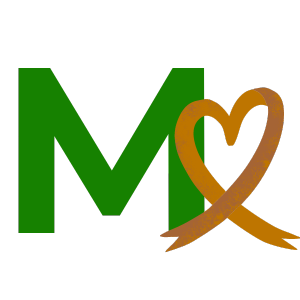Promoting cancer health literacy in Kenya through online stories
Every year, more people are diagnosed with cancer worldwide, in Sub-Saharan Africa, and especially in Kenya. Receiving a cancer diagnosis is overwhelming, and patients and their family members need information and competences to understand the diagnosis, live with it, and make good decisions (=cancer health literacy). One effective way to provide information and improve cancer health literacy is through educational interventions. These interventions should be accessible from anywhere, timely, relevant, engaging, and credible. A website with testimonials from cancer patients and additional information may be a promising solution. However, no such online educational intervention currently exists in Kenya, nor is there evidence on what constitutes cancer health literacy in Kenya, what an attractive online intervention should look like, and whether it can effectively improve cancer health literacy. (See poster)
 In the CaLioS postdoctoral research project, we first want to better understand cancer education and the cancer health literacy among cancer patients in Kenya. To this end, we will conduct a literature review and qualitative semi-structured interviews with experts (cancer patients, cancer NGOs, health care providers, and health education specialists) to identify the information and competence needs of cancer patients and their relatives, map cancer education interventions in Kenya, and explore the perceived potential of using (digital) testimonials to promote cancer health literacy and how to design an appealing and informative website.
In the CaLioS postdoctoral research project, we first want to better understand cancer education and the cancer health literacy among cancer patients in Kenya. To this end, we will conduct a literature review and qualitative semi-structured interviews with experts (cancer patients, cancer NGOs, health care providers, and health education specialists) to identify the information and competence needs of cancer patients and their relatives, map cancer education interventions in Kenya, and explore the perceived potential of using (digital) testimonials to promote cancer health literacy and how to design an appealing and informative website.
Based on this, we will develop a framework model for cancer health literacy in Kenya and a website to promote cancer health literacy in Kenya (inspired by a good practice example from the UK) that is content-, context-, language-, and culture-specific. The core of the website will be interviews with breast and prostate cancer patients from Kenya, which will be pedagogically edited, categorized into relevant topics, and shared online and through social media. The website aims to support newly diagnosed cancer patients and their family members in Kenya to improve their cancer health literacy, such as the ability to understand the disease, treatment, and living with it, and to get ideas on how to cope and improve their quality of life. In addition, the content of the narrative interviews with breast and prostate cancer patients will be analysed using grounded theory to inform healthcare providers and inspire more patient-centred care.
Next, we will conduct a feasibility study to evaluate whether this online intervention improves cancer health literacy of cancer patients more than the standard cancer education intervention (effectiveness). For this purpose, newly diagnosed cancer patients will be invited to participate in the study and will receive access to the website either immediately or after a waiting period access in addition to the usual educational interventions. In a pre- and post-test study, we will explore the website’s acceptability, practicability, and effectiveness in improving cancer patients’ cancer health literacy, coping skills, and quality of life.
Finally, with collaborating partners from selected other Sub-Saharan African countries, we will apply for a larger grant to expand this intervention to other diseases and countries in Sub-Saharan Africa and to scientifically evaluate its development, implementation, and effectiveness.
The research proposal (for phases 2 to 4) has been reviewed and approved by the Ethics Research Commissions of the University of Freiburg, Germany (Nr. 23-1491-S2) and of Mount Kenya University (Nr. 2405), which are responsible for ensuring that research participants are protected from harm. The research permit was granted by the Kenyan National Commission for Science, Technology & Innovation (NACOSTI/P/23/32006).
The research proposal for feasibility study was reviewed and approved by the Institutional Scientific and Ethics Research Commissions of the Mount Kenya University (Nr. 3257) and of the University of Freiburg, Freiburg, Germany (Nr. 24-1475-S2). The research permit was granted by the Kenyan National Commission for Science, Technology & Innovation (NACOSTI/P/24/42242).
Principal Investigators: Dr Stefanie Harsch, Dr Victor Oria, supported by Dr Dinah Kassaman, Dr Ruth Mbugua, Dr Sarah Beth, and other researchers
Organisation: University of Freiburg, Center for Medicine and Society, Germany; Integrated Cancer Research Foundation of Kenya, Kenya, and collaborating partners
Funded through the German Alliance for Global Health Research by the German Federal Ministry of Education and Research
Project name: CaLioS – Promoting cancer-related health literacy through online stories in Sub-Saharan Africa, using Kenya as an example
